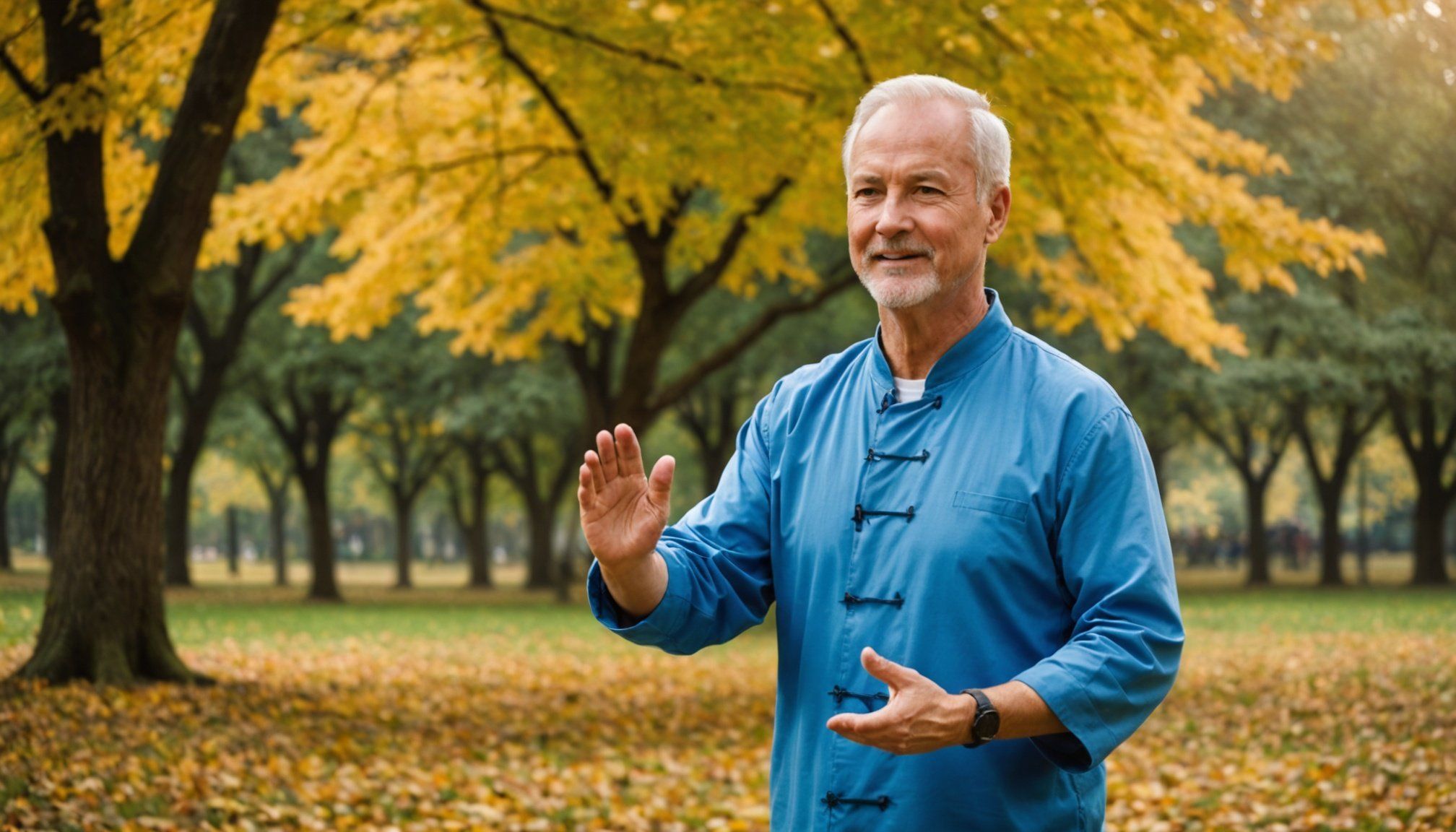Revitalize Your Health: The Life-Changing Benefits of Weekly Tai Chi for Middle-Aged Wellness
What is Tai Chi and How Does it Work?
Tai Chi, an ancient Chinese martial art, has evolved over the centuries into a low-impact exercise that is perfect for middle-aged individuals looking to enhance their overall health and wellness. At its core, Tai Chi involves a series of deliberate, flowing motions performed in a slow, relaxed manner, often referred to as “meditation in motion”[5].
The Philosophical Background
Tai Chi is deeply rooted in Chinese philosophy, particularly Taoist and Confucian thought. It emphasizes the balance of yin and yang, the flow of vital energy (qi), and the principles of softness overcoming hardness and effortless action (wu wei)[5]. This philosophical background sets the stage for a holistic approach to health, focusing not just on physical movement but also on mental clarity and spiritual well-being.
Also to read : Maximizing Athletic Performance: How Gluten-Free Diets Enhance Sports Recovery and Thriving
The Practice of Tai Chi
A typical Tai Chi session includes various elements such as Dao Yin (easy-to-learn exercises and gentle stretches), Chi Kung (exercises with synchronized breathing), and Tai Chi Chuan (a series of movements performed in a slow, relaxed, and flowing way)[4]. These movements are designed to improve balance, coordination, and body awareness while integrating mental attention and relaxation techniques.
Physical Health Benefits of Tai Chi
Tai Chi is renowned for its numerous physical health benefits, making it an ideal exercise for middle-aged individuals.
Also read : Unlock Vitality: The Ultimate Senior’s Guide to Reaping Health Benefits from Water Aerobics
Improving Balance and Reducing Falls
One of the most significant physical benefits of Tai Chi is its ability to improve balance and reduce the risk of falls. The slow, controlled movements help enhance proprioception, the ability to sense the position of your body in space. This is particularly important for older adults, as it can significantly reduce the risk of falls and related injuries[2][3].
Building Muscle Strength and Endurance
Tai Chi is a weight-bearing exercise that helps build and maintain muscle mass, which is crucial for older adults to prevent age-related muscle loss. It also improves flexibility by loosening tight joints and enhancing range of motion. This makes it easier for individuals to perform daily tasks and maintain their independence[2].
Managing Chronic Pain
For those suffering from chronic pain conditions such as arthritis or nerve damage, Tai Chi offers a gentle yet effective solution. The combination of movements, breathing techniques, and meditation helps reduce stress and promote relaxation, thereby alleviating chronic pain symptoms[2][4].
Mental Health Benefits of Tai Chi
The mental health benefits of Tai Chi are just as profound as its physical benefits.
Enhancing Mental Clarity and Concentration
Regular practice of Tai Chi has been shown to improve memory, focus, and mental clarity. It encourages individuals to focus on the present and avoid distractions, leading to better concentration and mental clarity. This is particularly beneficial for seniors who may experience cognitive decline[2][3].
Reducing Stress and Anxiety
Tai Chi’s meditative element helps reduce stress and anxiety by promoting deep, controlled breathing and relaxation. This can lead to an overall improvement in mental health, reducing the risk of depression and other mental health issues[2][4].
Heart Health and Other Systemic Benefits
Tai Chi also has a positive impact on heart health and other systemic aspects of your health.
Lowering Blood Pressure
Regular practice of Tai Chi has been shown to lower blood pressure and reduce the risk of heart disease. The deep breathing and relaxation techniques help improve cardiovascular health, making it an excellent exercise for those at risk of heart disease[2].
Improving Sleep Quality
Tai Chi can help improve sleep quality by reducing stress and promoting relaxation. Better sleep is essential for overall health, as it helps your body repair and rejuvenate itself[2].
How to Incorporate Tai Chi into Your Life
Incorporating Tai Chi into your weekly routine is easier than you might think.
Finding a Class or Instructor
To get the most out of Tai Chi, it is recommended to find a qualified instructor who can guide you through the movements and techniques. Many community centers, gyms, and specialized Tai Chi schools offer classes for beginners. You can also find online resources and videos to help you get started[4].
Creating a Home Practice
Once you are familiar with the basics, you can create a home practice. Start with short sessions and gradually increase the duration as you become more comfortable with the movements. It is essential to wear comfortable clothing and practice in a space where you can move freely[4].
Practical Tips and Advice
Here are some practical tips to help you make the most out of your Tai Chi practice:
- Start Slow: Begin with short sessions and gradually increase the duration as you become more comfortable with the movements.
- Focus on Breathing: Deep, controlled breathing is a key component of Tai Chi. Focus on your breath to get the most out of your practice.
- Practice Regularly: Aim to practice Tai Chi at least 2-3 times a week, ideally 4 times if possible, to see significant improvements in your health.
- Find a Community: Joining a Tai Chi class or group can provide social benefits and help you stay motivated.
Comparative Benefits: Tai Chi vs. Other Exercises
Here is a comparative table highlighting the benefits of Tai Chi versus other popular exercises for middle-aged individuals:
| Exercise | Physical Benefits | Mental Benefits | Ease of Learning | Risk of Injury |
|---|---|---|---|---|
| Tai Chi | Improves balance, strength, flexibility | Enhances mental clarity, reduces stress and anxiety | Easy to learn, slow and controlled movements | Low risk of injury |
| Yoga | Improves flexibility, strength, balance | Reduces stress, improves mental clarity | Can be challenging for beginners, depends on the style | Moderate risk of injury |
| Resistance Training | Builds muscle strength, improves endurance | Limited mental benefits | Can be challenging, requires equipment | Higher risk of injury if not done correctly |
| Walking | Improves cardiovascular health, boosts endurance | Limited mental benefits | Easy to start, but may not engage the mind as much | Low risk of injury |
Real-Life Examples and Testimonials
Many people have found Tai Chi to be a life-changing exercise. Here’s what some practitioners have to say:
- “Tai Chi has helped me manage my chronic pain and improve my balance. It’s like a moving meditation that keeps me grounded and focused.” – Sarah, 55
- “I was skeptical at first, but after a few weeks of practicing Tai Chi, I noticed a significant improvement in my sleep quality and overall mental clarity.” – John, 52
- “Tai Chi is more than just an exercise; it’s a way of life. It has helped me connect with my body and mind in a way that no other exercise has.” – Emily, 48
Scientific Evidence and Studies
Numerous studies have validated the health benefits of Tai Chi. Here are some key findings:
- A systematic review and meta-analysis found that Tai Chi significantly improved cognitive and physical functioning in patients with mild cognitive impairment, especially when enhanced by communication technologies[1].
- A study comparing Tai Chi, Yoga, and resistance training found that Tai Chi had the most significant positive impact on balance and gait for people with Parkinson’s disease[3].
- A review of 13 studies concluded that Tai Chi had a positive effect on the quality of life and depressive symptoms of older adults with chronic conditions[5].
Incorporating Tai Chi into your weekly routine can have profound benefits for your health, from improving physical balance and strength to enhancing mental clarity and reducing stress. Whether you are looking to manage chronic pain, lower your blood pressure, or simply improve your overall quality of life, Tai Chi offers a holistic approach that is both accessible and effective.
Before you start, it’s always a good idea to consult with your doctor, especially if you have any underlying health conditions. However, with its low-impact nature and numerous health benefits, Tai Chi is an exercise that can be enjoyed by people of all ages and fitness levels.
So why not give Tai Chi a try? It might just be the life-changing exercise you’ve been looking for to revitalize your health and well-being.











